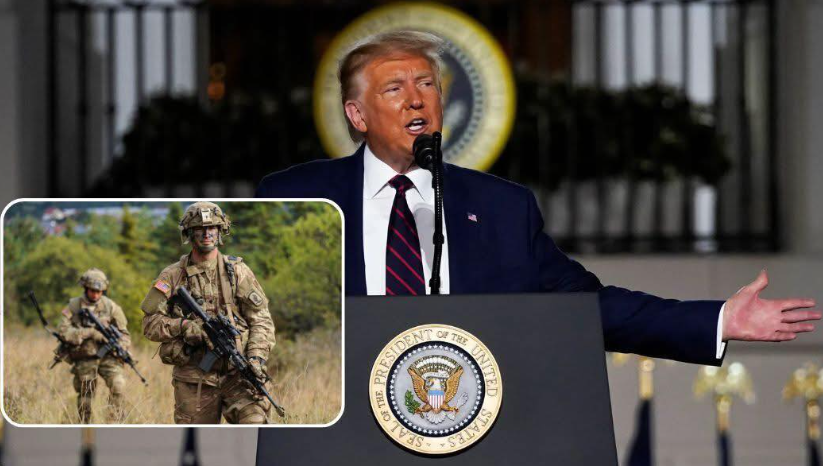As Washington remains paralyzed by bitter partisanship and legislative gridlock, a single act of private generosity has jolted the nation awake, cutting through the endless political stalemate like a sudden, unexpected lightning strike. For weeks, U.S. troops stationed across the globe had served without pay, their dedication and sacrifice met with silence from lawmakers embroiled in yet another deadlock over budgets and spending bills. Families waited anxiously at home, bills went unpaid, and the very backbone of American defense risked being shaken not by enemy action but by bureaucratic inertia. Then, as if out of nowhere, relief arrived: an anonymous $130 million donation ensured that every soldier would receive their salary, on time and without interruption.
Speculation was immediate and relentless. The press, armed with leaks and conjecture, pointed fingers at the nation’s wealthiest and most reclusive figures. Whispers quickly coalesced around a single name: Timothy Mellon, the secretive billionaire heir whose vast fortune traces back to America’s industrial age, a figure known for both enormous wealth and an almost ghostly avoidance of public attention. Neither Mellon nor the White House confirmed the rumors, but the story spread like wildfire through news cycles, social media feeds, and water-cooler conversations, igniting both widespread praise and sharp criticism.
For many, the act represented a rare and vivid reminder that individual action can still rise above political paralysis. A private citizen, some argued, had stepped into the void left by Congress and the executive branch, demonstrating that patriotism and compassion need not wait for legislation. Families of soldiers, who had been balancing mounting expenses and sleepless nights, finally felt a tangible sense of relief. Their children could eat, bills could be paid, and a profound weight lifted off their shoulders. For them, the ideological debates swirling in Washington mattered far less than the simple assurance that their loved ones’ service would not go unpaid.
Yet, amid the applause, the donation sparked a fierce national debate. Critics warned that the gesture exposed a dangerous new reality: billionaires, they argued, are increasingly stepping in to solve problems that the government is constitutionally mandated to handle. What happens, they asked, when private wealth—not elected representatives—determines the livelihoods of those who serve the nation? Does it set a precedent that undermines democracy, or simply illuminate the failures of elected leaders who cannot act even in the most critical moments? Across newspapers, opinion shows, and online forums, voices clashed. Some hailed the act as heroic, a shining example of private generosity in a time of national dysfunction. Others decried it as emblematic of a dangerous inequality, a society where fortunes can buy solutions to crises that should never exist in the first place.
For Timothy Mellon, the man at the center of the storm, very little was publicly known about his motives. Known for his reclusiveness, Mellon had rarely spoken to the media and had carefully cultivated an image of discretion. Yet in this moment, his name—and the enormity of his donation—shone across headlines and news feeds worldwide. Friends and associates speculated privately that Mellon’s gesture might be rooted in personal patriotism, a long-standing commitment to supporting the military, or perhaps a recognition of a moral duty that transcended political debate. Whatever the reason, the impact was immediate and undeniable.
In military communities, the donation was felt viscerally. Soldiers stationed in far-flung regions, often isolated from friends and family, received electronic notifications confirming that their paychecks would be restored. The reaction was one of relief, gratitude, and quiet astonishment. For military spouses, who had endured weeks of uncertainty, the news sparked tears and emotional reunions. Social media buzzed with posts of heartfelt thanks, images of family dinners, and expressions of collective relief. Amid the partisan rancor and news fatigue, a rare moment of unity emerged, grounded not in politics but in human empathy and the recognition of service.
Yet even as relief spread, the broader implications of the donation rippled through the nation’s consciousness. Analysts and commentators debated the moral and ethical dimensions of private wealth intervening in public obligations. Could a single individual’s action highlight the failings of government oversight, or was it merely an anomaly, unlikely to be repeated on such a scale? The conversation spilled into classrooms, living rooms, and workplaces, raising fundamental questions about the role of private citizens, philanthropy, and the responsibilities of elected officials.
Ultimately, for thousands of military families facing empty bank accounts and mounting uncertainty, ideology mattered far less than the tangible relief that had arrived in the form of one man’s extraordinary generosity. In a divided America, where partisan gridlock often leaves critical needs unmet, the story of Timothy Mellon’s donation stands as both an inspiring testament to human compassion and a sobering reflection on the fragility of public systems. It poses a question that now resonates more urgently than ever: in a nation where leaders can stand still, who truly serves when duty, conscience, and generosity are tested?
And as the nation digests the implications of this historic gift, one thing remains clear: for those on the front lines, Timothy Mellon’s contribution was more than a headline. It was a lifeline, a symbol that even amidst the gridlock of politics, acts of conscience and generosity can still illuminate the path forward. The debate will rage, and opinions will diverge—but for one critical moment, the generosity of a single individual bridged a gap that many thought could never be closed, reminding the nation that, even in times of division, humanity can still prevail.
